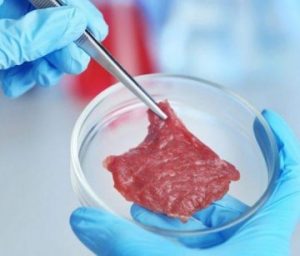By Amelia Luca -CNBC News
- Singapore Food Agency has approved Eat Just’s cell-cultured chicken, making the country the first in the world to give its go-ahead to selling meat created in a lab.
- Cultured meat is made by putting stem cells from the fat or muscle of an animal into a culture medium that feeds the cells, allowing them to grow.
- U.S. approval of cultured meat still seems very far away, giving start-ups such as Eat Just a chance to reduce the cost of production before introducing more consumers to the product.

Josh Tetrick, CEO of Eat Just, had at least one thing to be grateful for this Thanksgiving: Regulators in Singapore had issued the company the world’s first approval for its cultured meats.
The decision paves the way for Eat Just, which is best known for its plant-based egg substitute, to sell its lab-grown chicken as an ingredient in Singapore. And it will also likely draw more competitors to the Southeast Asian country and could prompt other countries to follow Singapore’s lead.
“A new space race for the future of food is underway,” Good Food Institute Executive Director Bruce Friedrich said in a statement.
In the last decade, dozens of start-ups have sought to make cell-cultured meat both tasty and affordable with the end goal of persuading consumers to turn their backs on conventional meat. Similar to the makers of plant-based meat alternatives, start-ups such as Eat Just, Future Meat Technologies and the Bill Gates-backed Memphis Meats argue that their products are healthier for consumers and better for the environment.
“We think that [the way] to really solve the meat problem — which is a health problem, a deforestation problem, a morality problem — is to make animal protein,” Tetrick said in an interview.
Eat Just landed at No1 on CNBC’s Disruptor 50 list this year for its efforts to change the food and agriculture industries. The company has raised $300 million and was last valued at $1.2 billion.
Cultured meat is made by putting stem cells from the fat or muscle of an animal into a culture medium that feeds the cells, allowing them to grow. The medium is then put into a bioreactor to support the cells’ growth. Tetrick compared the process to brewing beer, with a very different end product.
Eat Just has been working toward gaining approval from the Singapore Food Agency for about two years. To do so, it had to meet food safety requirements for novel foods and demonstrate a consistent manufacturing process for the cell-cultured chicken. Safety and quality inspections determined that it also met the standards for poultry meat.
The product has a high protein content and a diversified amino acid composition, no antibiotics and very low microbiological content, such as salmonella and E. coli.
Eat Just is going through other regulatory processes to get its cultured meat approved elsewhere in the world, including the United States. What set Singapore apart from the others, according to Tetrick, was its “forward-thinking and rigorous” approach. The Good Food Institute, which advocates for alternative proteins, said that it’s been meeting with Singaporean government officials to discuss cultured meat for more than three years.
But in the U.S., regulatory approval for cultured meat seems much further away. The Food and Drug Administration and the U.S. Department of Agriculture have officially overseen the regulation of cell-based seafood, poultry and beef since 2019. But, like plant-based meat, the products will face opposition from traditional meat producers, such as the U.S. Cattlemen’s Association.
Besides regulatory approval, high production cost is one of the primary barriers to the industry’s success. In 2013, a hamburger from Dutch start-up Mosa Meat cost $280,000 per patty to make. But the costs have come down over the years as scale has increased. Eat Just, for example, is using 1,000-liter bioreactors for its cell-cultured chicken, and Tetrick said the company plans to price it similar to that of premium chicken.
Still, the company is far away from bringing its chicken to every household in Singapore. Tetrick said that the product, which will be sold under its new Good Meat brand, will launch at a single restaurant in the country in the near future.
“We’re going to start out with a single restaurant and then scale out to five, 10, 15 and then eventually into retail,” Tetrick said. “The infrastructure required to do it is primarily the bioreactors, so we’ll eventually be moving to 5,000, 10,000 and 20,000 liters.”
Eat Just has already partnered with local manufacturers in Singapore in preparation for the regulatory approval and eventual sale of its cultured chicken.
The company is also planning to campaign for consumer trust in the product. Tetrick said that will include being transparent about how Eat Just makes cell-cultured meat and reminding consumers about the process of conventional meat production.
As Eat Just scales up, the company aims to keep reducing the price, which should also attract consumers and restaurants to try the product.
“Ultimately, this doesn’t become something until it becomes the cost of something that really matters, until we’re below the cost of conventional chicken,” Tetrick said.



